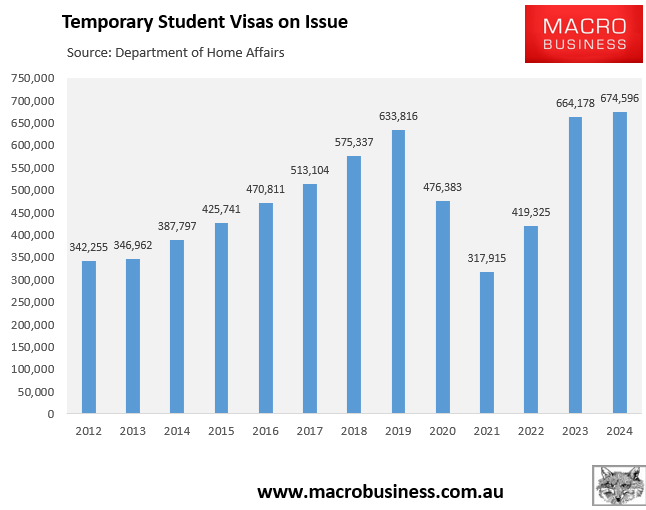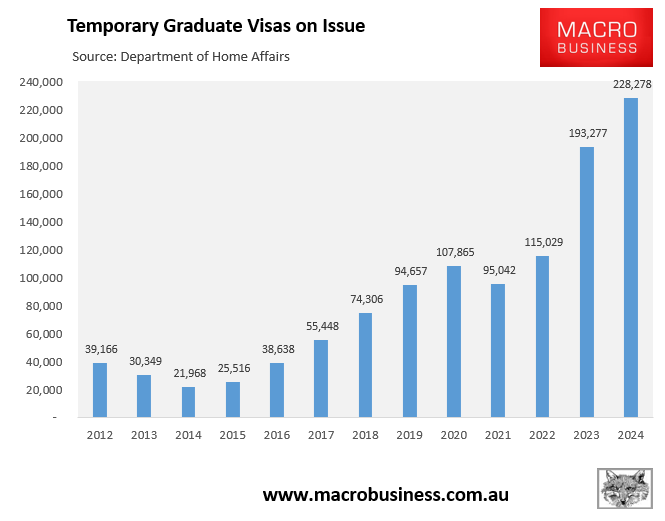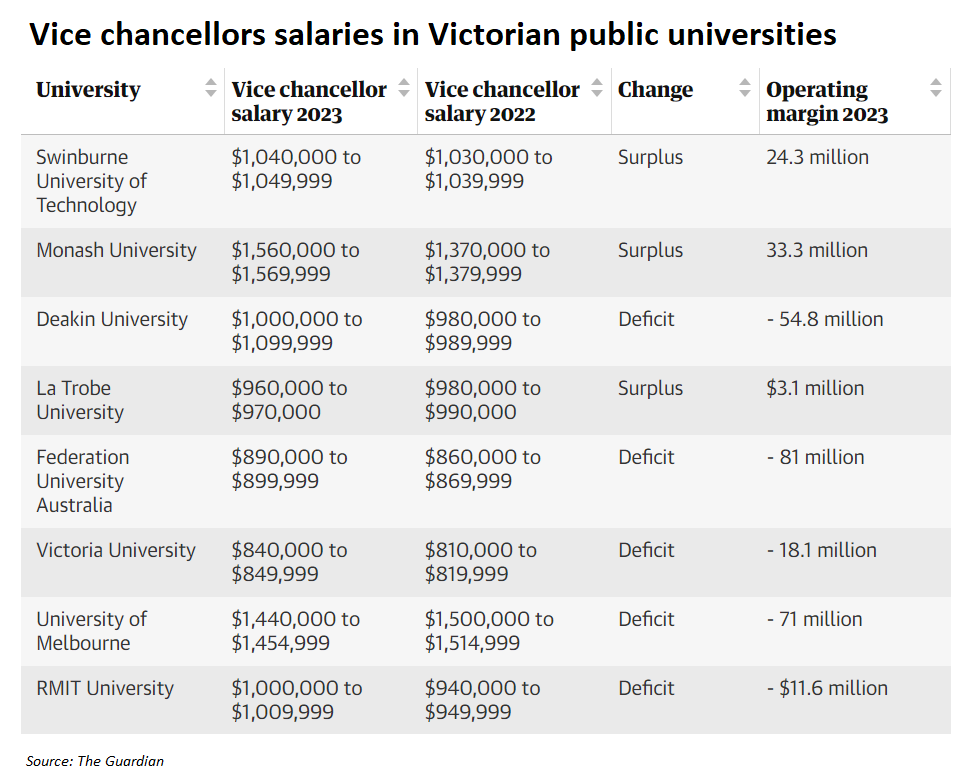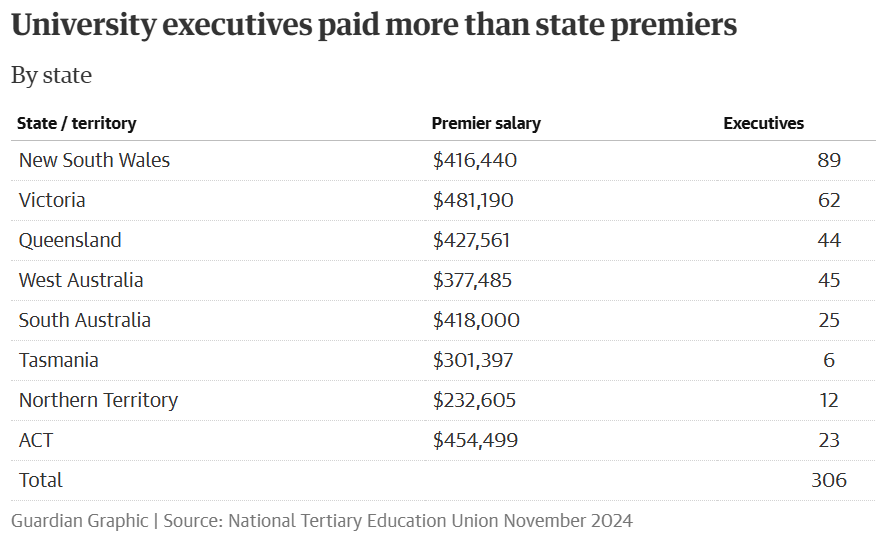Over the last two decades, Australia’s universities have transformed into greedy, revenue-driven enterprises.
To summarise, the federal government and Australian universities developed a framework to encourage large numbers of full-fee-paying international students by:
- The Australian government offered generous student visa work rights and prospects for permanent residency.
- Australian institutions lowered entry and teaching standards.
The cash bonanza from increased international student numbers was spent on research geared purely at driving Australian universities up the world rankings rather than areas that benefited Australians.


Because a better worldwide rating improves a university’s reputation and indicates quality, Australian institutions utilise these rankings as a marketing tool to entice more international student enrolment while justifying higher tuition fees.
It’s an incredible Ponzi scheme for Australian institutions. 1) Bring in planeloads of international students. 2) Use a portion of the fee revenue for research. 3) Achieve a favourable global ranking; 4) Sell to more overseas students. 5. Rinse and repeat.
Data released in May revealed that over half of Victoria’s vice-chancellors earned more than $1 million in annual salaries.
Six of the eight vice-chancellors also received hefty pay increases last year.

Separate data released last month by the Guardian revealed that more than 300 Australian university executives earn more than state premiers.

Meanwhile, Australia’s million-dollar university vice-chancellors and selfish administrators treat students like cattle, cramming them into overcrowded classrooms and delivering them generic, cookie-cutter lessons.
Domestic students have also been obliged to assist non-English speaking students in completing their courses via group projects.
Local students are regularly paired with international students, resulting in domestic students doing the majority of the work, effectively acting as unpaid tutors and cross-subsidising international students’ grades.
In essence, universities and private colleges are privatising the benefits of record-high student enrolments, while all Australians—particularly renters seeking housing—bear the burden.
The corporatisation of universities has become so bad that National Tertiary Education Union (NTEU) research discovered that corporate heavyweights are co-opting university governing councils, resulting in a “circular system of patronage” that maintains underpaying employees and overpaying executives.
According to an NTEU assessment of 545 council positions at 37 institutions, members from the Big Four accounting firms and industry groups hold up to half of the roles, with some governing councils having more finance or mining executives than current academic practitioners.
Meanwhile, the rise of large corporate appointments on university boards and executive pay coincided with increased precarious work, wage theft, and poor governance.
NTEU national president Alison Barnes says “public universities are prolific wage thieves” and that wage theft “has become baked into universities’ business models”.
Her comments come after the Fair Work Ombudsman (FWO) ordered Sydney University to pay almost 15,000 workers $23 million in stolen wages, with the university apologising for nine years of wage theft.
Fair Work Ombudsman Anna Booth said the university had acknowledged its governance payments and breaches and self-reported its payroll errors, while Barnes says there needs to be an urgent federal parliamentary inquiry into the ‘broken’ university governance model.
Melbourne University was also ordered by the FWO to backpay 25,000 staff over $72 million in wage theft.
“Systemic failures in compliance, oversight and governance processes were key causes of the underpayments”, FWO Anna Booth said.
Universities, not taxpayers, are ‘clipping the ticket’ and earning considerable economic rents from Australia’s immigration system via student fees.
Running low-quality student visa mills with high throughput was never in the national interest.
Nevertheless, Australia has created a system that rewards university executives with large salaries for effectively transforming their universities into low-quality, high-volume immigration mills.
Rather than continually lowering standards to lure more international students of doubtful quality to Australia, policymakers should aim to recruit a much smaller pool of excellent (genuine) students.
This could be achieved with the following types of reforms:
- Significantly increasing English-language standards and requiring prospective students to complete entrance examinations before being permitted to study in Australia.
- Significantly increasing financial requirements, including requiring funds to be paid into an escrow account before arriving in Australia.
- Reducing the number of hours that international students are allowed to work and severing the direct link between study, work, and permanent residency.
- Allowing only top-of-class graduates to receive graduate visas.
- Because Australian universities are non-profit enterprises that do not pay taxes, imposing a levy on international students to ensure that Australians receive a financial return from the trade.
Universities should also be required to provide on-campus housing for international students in proportion to the number of enrolments to reduce pressure on the private rental market.
In summary, Australia’s international education sector must aim for quality over quantity.

